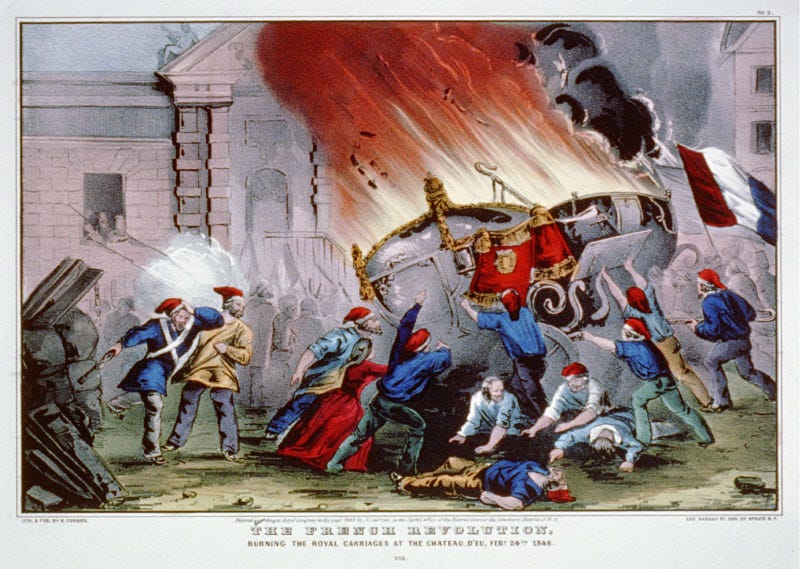It Only Breaks If You Break It
Protestors may not accomplish much today, but only a fool concludes its futile.
A reader of TLM commented on one of my notes about the “Hands Off 2025” protests the following:
It won’t change a damn thing but I hope it makes people feel better. Trump is not going to do anything differently.
Of course, it’s always a Substacker with no profile pic, two subscribers, and a feed full of nonsense. I suppose it could’ve been more amusing if it came from a MAGA bot—at least then I’d get the usual screed about being a cuck or a sheep, followed by a few colorful ad hominems.
But what this “person” (assuming it wasn’t an Elon manifestation of Grok gone Substack) said is something I think many people do feel, and say—sometimes even to themselves. I’ve said versions of it, too, especially when I see polls. I remind people: polls are not policy.
Because they’re not.
The fact that an overwhelming number of Americans think Trump is an incompetent clown will not change what laws are passed, what rights are stripped, or what agencies are dismantled.
That’s not how a constitutional republic functions.
But apathy is compliance.
And while actions have consequences, so does inaction. If nothing else, you have to be able to look yourself in the mirror and ask whether you can live with the reflection.
If for no other reason, that is why it matters.
Micro actions have macro consequences
During the Battle of Dunkirk, as British forces were pinned to the sea and facing what many feared would be extinction, Foreign Secretary Lord Halifax urged Churchill to sue for peace.
Churchill refused.
“Nations that go down fighting rise again, but those who surrender tamely are finished. If our long island story is to end, let it be only when we lie choking in our own blood.”
Let it be only when we lie choking in our own blood.
That is not optimism.
That is not hope.
That is not a Pollyanna view of the world.
That is a realist’s view of the morality of action, even in the face of overwhelming adversity.
That is the honest answer to whether or not “it matters.”
Because most circumstances aren’t closed-end, winner-take-all events. They’re not final. There is almost always a next round—except in death. And as long as you survive to play that next round, the game continues.
We often frame life like a finite contest: win or lose, success or failure. But in reality, most of life is an infinite game. It continues, with new variables, players, and choices—so long as you’re still breathing.
You may not like what comes next after a bad decision, but that doesn’t mean the game ends.
If you commit murder and are convicted, your life will change forever. Most people wouldn’t want that outcome. But even then, the game doesn’t end. You still have choices. You can continue the same behaviors in prison and find yourself deeper in hell. Or you can chart a different path. Each choice has its own consequence.
You may not like what comes next.
But that doesn’t mean the game is over.
Micro actions have macro outcomes. (It’s not a slogan. It’s how history works.)
We tend to think speeches, battles, or sweeping legislation shape history. But more often, it’s shaped by quiet refusals. By a teenager who says “no.” By someone who keeps walking when they’re told to stop. By the decision to act—not because it guarantees victory, but because not acting guarantees surrender.
Claudette Colvin, Rosa Parks, and Martin Luther King, Jr.
Rosa Parks didn’t dismantle segregation by herself. She just refused to give up her seat.
Before Rosa Parks, there was Claudette Colvin. You likely have never heard about her, she’s not famously identified with the boycotts, and I imagine if you put a gun to the heads of 100 Americans and asked them to identify her or eat a bullet, you’d have 100 bodies on the ground.
But Claudette Colvin matters.
In March 1955, nine months before Parks refused to give up her seat, 15-year-old Claudette Colvin did exactly that in Montgomery, Alabama. She was forcibly removed from a segregated bus and arrested for violating Jim Crow laws.
She was bright, passionate, and deeply influenced by her high school teachers, particularly those who taught Black history and the Constitution. She later said she was inspired that day by thinking of Sojourner Truth and Harriet Tubman. When the bus driver ordered her to move, she said:
"It felt like Sojourner Truth was on one side of me, and Harriet Tubman was on the other side, pushing me down. I couldn’t get up."
But despite her courage, Colvin wasn’t seen as the “right” figure for a broader movement. She was a teenager, dark-skinned, from a working-class background, and weeks after her arrest, she became pregnant by an older, married man. The civil rights leadership at the time feared that white media would seize on her personal life to discredit the cause.
So she was quietly pushed aside.
Rosa Parks, on the other hand, was an adult, married, light-skinned, educated, and already well-respected in the community as a secretary for the local NAACP chapter. Her resistance in December 1955 was, in many ways, more strategically timed and politically viable—though no less courageous.
But it’s important to remember: Claudette Colvin walked so Rosa Parks could sit.
And it was Colvin—not Parks—became one of the plaintiffs in Browder v. Gayle, the federal court case that ultimately struck down bus segregation in Montgomery as unconstitutional in 1956.
So when discussing micro actions leading to macro consequences, Colvin is a perfect example—and a reminder that history often sidelines those who don’t fit the narrative, even when their courage lights the path.
If Claudette Colvin had been the face of the Montgomery Bus Boycott—if the movement had rallied around a 15-year-old, dark-skinned, working-class girl who was pregnant out of wedlock—there might never have been a Martin Luther King Jr., at least not in the way we know him.
Because the movement would have likely failed.
Not because she wasn’t brave enough. Not because she wasn’t righteous. But because America wasn’t ready to follow her. The media would’ve shredded her. The Southern Christian Leadership wouldn’t have backed her. The fragile coalition of Black churches and middle-class institutions in Montgomery would have fractured. And the national press would have buried the story under layers of moralistic judgment.
The movement needed someone the establishment couldn’t easily dismiss. Someone polished. Respectable. Married. Male. A minister. Someone whose moral standing wouldn’t be questioned, because they knew the movement’s optics would be.
Enter Martin Luther King, Jr.
The Montgomery Bus Boycott didn’t topple Jim Crow in a day. But it lasted 381 days. People walked to work. Organized carpools. They sacrificed convenience for conviction. A million tiny decisions—I will not ride that bus—rippled into federal legislation.
Vaclav Havel
When Vaclav Havel sat down and wrote his essay The Power of the Powerless, he didn’t know it would become the intellectual backbone of a revolution. But it did. Because millions of Czechoslovakians, tired of pretending, started living as if they were free. They stopped displaying the signs in their windows. They stopped applauding at the wrong moments. They stopped lying. Those little refusals—those micro acts of truth—collapsed a regime.
Even the Berlin Wall didn’t fall because someone launched a coordinated military effort. It fell because someone on East German television misread a policy announcement. And then someone else—just a regular guy—walked up to the border and asked to be let through. And a guard, who wasn’t ready to murder a fellow German on live TV, opened the gate.
The system broke not with a bang, but with a shrug.
Change never feels big while it’s happening. It feels like one person deciding they’ve had enough. One act of conscience. One honest word in a sea of lies.
You don't need to be Churchill.
You don’t even need to be Colvin, Parks or Havel.
You just need to act when the moment calls for it—because every action tells the system what it can and cannot get away with.
And when enough people act—even in different places, even for different reasons—systems shift.
Fear Is the Only Political Currency
Let’s stop pretending this is about changing Trump.
It’s not.
Trump will not moderate. He will not pivot. He will not be “persuaded” by policy, fact, logic, or mass rejection. His entire psychology is built on dominance. On the illusion of strength. And as long as people around him are afraid not to obey, that illusion remains intact.
So the goal is not to reach Trump.
The goal is to break the illusion by making the people who prop him up more afraid of us than of him.
Because that’s how this works, that’s how it always works.
Authoritarians don’t fall because they’re wrong. They fall because the people protecting them realize they’re going down with the ship.
They don’t fear truth. They fear losing control of the narrative. They fear becoming irrelevant. They fear being on the wrong side of history, not because of guilt—but because of career death, social exile, or real-world consequences.
And the only way those fears become real is if they see that the populist energy they thought they owned is slipping away.
When MAGA stops being the loudest voice.
When the streets don’t belong to them anymore.
When the headlines flip, and the vibe shifts, and every handshake starts feeling colder.
That’s when the enablers start looking for an exit.
And they will turn on Trump in a heartbeat if doing so lets them keep their jobs, their pensions, or their reputations. They are cowards. That’s why they backed him in the first place.
Look at the tape.
Joseph McCarthy ran wild for years—until he went too far, humiliated the military, and the Senate turned on him. Not because they disagreed with his politics. But because they saw the polling collapse. The hearings. The public revulsion. They got scared of being tied to a clown.
Richard Nixon didn’t resign because of Watergate. He resigned when Barry Goldwater walked into the White House and told him the GOP wouldn’t protect him anymore. His enablers cut him loose—not because he was guilty (everyone already knew that), but because he became a political liability.
Augusto Pinochet, the iron-fisted dictator of Chile, held onto power for 17 years—until a shock referendum forced a vote. And even though Pinochet tried to rig it, the people showed up anyway. They waited in line. They wore “No” pins. They sang. They stood in the streets. And when the vote came in, the margin was too big to hide. The military let him fall. Because they even realized the game had changed.
Hosni Mubarak, the Egyptian autocrat, ruled for 30 years. But when the Arab Spring came and Tahrir Square filled with hundreds of thousands of people, day after day, night after night, the military flipped. He was forced to resign—not because of human rights reports, but because the regime feared the crowd more than the tyrant.
This is the principle:
Authoritarians don’t fall when they lose arguments.
They fall when their protectors feel afraid and exposed.
They fall when the second-tier functionaries—the state legislators, the congressional backbenchers, the cabinet deputies—start looking around and saying,
“Wait… am I next?”
They fall when fear shifts sides.
And that’s what demonstrations like Hands Off 2025 are about.
Not persuasion. Not vibes.
Power.
Every protest, gathering, and viral moment that shows a new populism rising—one that isn’t built on submission to a strongman—forces the system to recalculate the risk.
Republican governors, state legislators, GOP donors, right-wing sheriffs—they all know Trump is a liar. But they’ve told themselves they can ride it out.
You want to end that delusion? Show them the ride is ending.
Make these people fear for their political fortunes, their power, their money, and their place in society, and I assure you - shit breaks. But YOU are going to have to be the ones to break it.
Fill the streets. Refuse to comply. Make them squirm in interviews. Make them defend the indefensible. Make them feel the heat. Make them realize that staying silent isn’t safe anymore.
Not because they grew a conscience, but because they finally grew a survival instinct.
Because the only thing that can outmatch authoritarian power is mass refusal.
Not just of citizens. But of the middlemen. The climbers. The cowards.
When they jump, the edifice cracks.
That’s why the Kings fell. That’s why the Dictator fled in the middle of the night. That’s why segregation ended in the United States. That’s why the “Red Scare” came to an end.
Our future is built—deliberately, collectively—through micro actions.
Each one of us has a choice.
So yeah—if I believe mass resistance is the only way this ends,
you might be wondering why I’m not the one in the street.
And the answer is simple:
I’m not trying to be a martyr.
I’m trying to stay alive long enough to still be useful.
I’m not staying to prove a point. I’m leaving because I know how these systems collapse and what happens to the people who stay too long pretending they can fix it from the inside.
So, I realize it may seem hypocritical to say this all matters and then not be the one out there.
But here’s what I’d say:
I did my bit for God and Country. Here we are anyway.
If nothing else, in the plainest terms, I know I’ve earned my right to make these statements and views. I earned my button a long time ago, defending the faith and the flag. Not a solitary colleague, former partisan, or friend from my days in government looks at this and says, We should hunker down and lean in.”
That’s the reality.
That said—I loved what I saw today. It makes me happy. I love that more and more people are finally becoming awake. I like seeing the new faces. I love seeing the new energy. And unlike Chuck Schumer, I’m more than willing to stand aside and let others run with the ball.
I’ll be cheering.
I’ll be giving.
And I’ll keep doing what needs to be done—financially, intellectually, and with moral clarity.
For the rest of you:
You want to stay? Then stay.
But don’t confuse proximity with courage.
And don’t confuse bearing witness with taking action.
This battle is won by destroying the narrative of invincibility.
Because if this thing breaks, it won’t be because someone made a noble speech.
It’ll be because someone finally stopped waiting—and started pushing.
It will break because millions of you decide, enough.
Today was an encouraging step in that direction.
POST SCRIPT: If for no other reason, show the world that not everyone pledged loyalty to a convicted felon and his emotionally unstable, rocket-huffing tech cult leader.
If you made it this far, you're probably not here by accident.
Subscribe for more writing like this—unfiltered, unsponsored, and focused on what matters. This work only continues if readers like you make it possible.







We attended the rally in Statesboro GA today. It's a small college town in the heart of Red Trump country. We were afraid there wouldn't be much of a turnout. Instead we counted 120 people and we missed some. There were many people driving by and honking in support. If that happens in the Reddest part of the country it gives me hope.
Claudette Colvin! I never heard the name before, and I grew up in Memphis while Rosa Parks refused to get up. Mr Finnegan, your posts are always outstanding, but this one rises to a whole new level. I can only give my heartfelt thanks. You are a patriot and an educator.
I am an 82 year old white retired professor who would give his eye teeth to teach as eloquently as you do. I did not go to today's protest in Portland because I can at best walk 2 blocks with the aid of a walker, and standing for 20 minutes is beyond me. But I did take a brief walk, during which I encountered a neighbor carrying an anti-Trump sign returning from today's protest. She guessed the crowd at about 5000 people. Multiply that bt 1200 protests and you have five million protesters, at least, out today. Outstanding.
I take your point about just protesting not being enough, but it is a start. Loudly refusing to accept Trump's lies, refusing again and again, will, I hope lead Congress people to realize that their positions are at risk if they continue to silently go along with Trump.
Finally, no one in his right mind would condem you for leaving. You have done more than your share. Thank you.